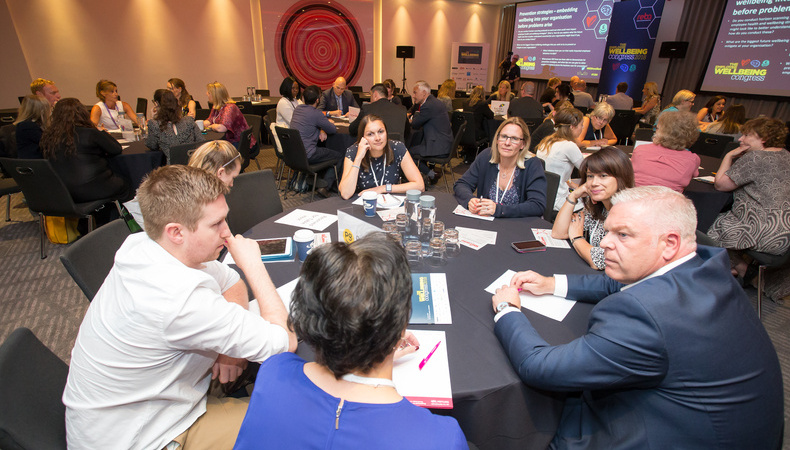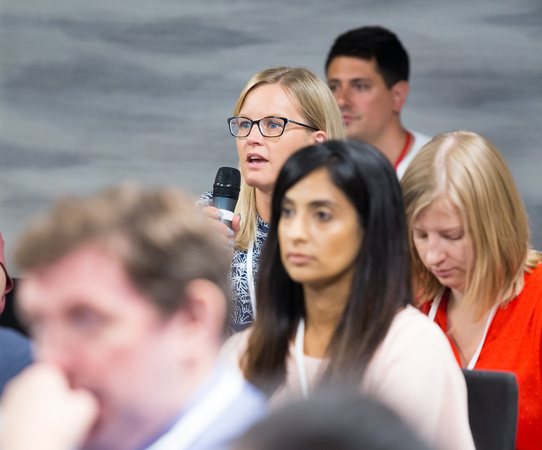Video tutorial: Phillip Coggan of The Economist on financial wellbeing and the UK economy
Video tutorial: The Co-operative Group's Alex Henley on financial wellbeing in a diverse workforce
Video tutorial: YBS Group's Tracey Newton on building a culture of financial wellbeing
Video tutorial: Shell's Alan Becken on putting employees' needs at the centre
Video tutorial: Ovo Energy's Jo Fairweather on innovation in workplace savings
Video tutorial: Unipart Group's Deborah Astles on encouraging employee savings
Video tutorial: Chrysaor's Corinne Kelt on financial wellbeing for a remote workforce
Video tutorial: IES's Duncan Brown on why some employers don't get financial wellbeing
Video tutorial: Mercer's Jeremy Milton on linking the dots with financial wellbeing
Video tutorial: Unilever's Nicola Wells & Sophie Haynes
Video tutorial: CSG's Richard Chataway on using behaviour change to drive financial decisions
Video tutorial: Facebook, RBS, Cisco and Mundipharma on future directions for financial wellbeing
Video tutorial: Heather Cooper explains Hargreaves Lansdown's financial wellbeing approach
Employee financial wellbeing is evolving.
Employers are now more engaged than ever with delivering financial wellbeing strategies and there is a hunger to move beyond the tactics and products already in place.
With strategic adoption being in its infancy though, where do we go from here?
- What role does the employer have in financial matters of the individual?
- What do you include in a financial wellbeing strategy?
- How does it align with your wider wellbeing strategy?
- Are there practical examples of what actually works?
- What outcomes can be expected?
To address these questions, we launched FinWell Forum - REBA’s first dedicated financial wellbeing conference.
Download speaker presentations below:
Speakers
On 7th March 2019, over 100 senior reward and benefit specialists from top companies came together to examine the issues, identify solutions, and explore consensus on employee financial wellbeing strategy best practice.
They investigated topics such as pay, insurance, discount schemes, debt management, financial education, savings, pensions, technology and 'at' and 'post' retirement solutions throughout the day.
With case studies, practical presentations, and much of the day given over to discussion groups, the format of the forum was sympathetic to the early stages nature of the topic and encouraged collaboration and sharing of experience and ideas.
Take a look at the full programme from the day...
Event Programme 2019
|
|
08.45 - Registration and breakfast
|
||||
|
|
09.15 - Chair's welcome and introduction
|
||||
|
|
09:30 - Opening keynote address: Financial wellbeing and the UK economyPhilip Coggan, columnist for The Economist and author of Paper Promises and Money Machine, will explore the relationship between big-picture economics and individuals' financial wellbeing. • What do current economic events mean for employees' personal finances?
|
||||
|
|
10.00 - Choice of real-life case studies with practical takeaways to implement
|
|
Case study 1: Financial wellbeing - putting employees’ needs at the centre |
|
Case study 2: How to communicate a financial wellbeing strategies to |
|
Case study 3: How to create a joined-up approach to financial wellbeing |
|
Case study 4: Innovation in workplace savings
|
10:50 - Networking and refreshment break
11.20 - Employer panel session: Future directions for financial wellbeing
Reward industry experts discuss current innovations in financial wellbeing, how they have used these in their own organisations and what they think the future of financial wellbeing will look like.
• How to identify employees' changing financial needs - and ways to address those changes
• Future priorities and directions for financial wellbeing
• Innovations in the financial wellbeing market and how to use new offerings to address employees' needs
• The long-term view - future directions
Mirka Slater, Benefits Manager, Facebook
Jim Cowan, Head of Benefits, RBS Group
Amanda Diston, Director - International Total Rewards, Cisco International
Amy Goodwin, Head of Reward & Wellbeing, Mundipharma
12:00 - Selection of tactical and strategic financial wellbeing roundtable discussion groups
In these sponsor facilitated discussions, delegates will share their experiences and learn more about the essential components of financial wellbeing.
Financial wellbeing for high earners - led by Hargreaves Lansdown
As more employees become affected by the Tapered Annual Allowance (TAA) and the Lifetime Allowance (LTA), traditional pensions are becoming a less effective way, especially for high earners, to save for retirement. This roundtable will discuss methods of rewarding employees who can no longer contribute sufficient amounts to pensions, and looks at alternative ways to help them invest for later life.
Workplace savings: how do you engage everyone - led by Smarterly
Pensions dominate the landscape but they don't engage all employees all of the time. With ongoing tax and economic changes coupled with changing financial priorities, pensions on their own do not tick all the boxes in a diverse workplace. How are employers building financial wellbeing strategies that supports and engage all employees across different age groups and earnings levels?
Financial advice and guidance in the workplace - led by Lorica
This roundtable will explore the reasons how offering financial advice and guidance can benefit employees, discuss barriers to introducing it and examine concerns around employer liability.
One solution doesn’t fit all: how to reframe your financial wellbeing strategy in the language of the Board and CEO - led by Salary Finance
In this roundtable, delegates will be encouraged to share methods of building a business case for their financial wellbeing strategy, while highlighting the key steps to creating and implementing a strategy based around the needs of their employees.
• Explore the link between financial wellbeing and mental health
• How do employers link financial wellbeing and productivity/retention?
• Factors affecting which financial wellbeing benefits are best suited to your workforce?
• What are the most important things to do, to make a financial wellbeing strategy effective?
Understanding individual needs: how to create an inclusive financial wellbeing strategy - led by Wealth Wizards
This roundtable will encourage participants to look at the importance of understanding the needs of employees before providing a solution.
• Understanding the needs of your individual employees
• Using this data to develop a scalable plan of action
• Using personalisation to address the priorities and needs of your workforce
How to implement a multi generational financial wellbeing strategy - led by Neyber
Many employees feel in the dark with their finances and the impact of this is being felt in the workplace. This roundtable will discuss:
• The role of research and segmentation
• Discuss what savings package appeal to all demographics of the workforce
• Explore ideas to empower employees with financial education ranging from debt management to pre retirement planning
• Secrets of successful employee engagement and share experiences of multi media comms channels
• What providers are in the market that support your strategy
Measuring financial wellbeing to design a tailored solution for your employees and your organisation - led by Close Brothers
• Defining financial wellbeing
• Measuring the financial wellbeing score for your organisation
• Identifying the key areas and employees groups most at risk
• Using these diagnostics to design a tailored financial wellbeing strategy and measuring its effectiveness post implementation
How to engage your employees using technology - led by Smart Pension
• Tactics to engage staff with pensions
• New technology
• Using data to profile and report
• How to create interest in investment options and default funds
• Capturing the imagination of employees around their financial wellbeing
Developing the right financial wellness strategy - Learning lessons from successful financial and health frameworks in the UK and wider International wellbeing space - led by Mercer
In this session we’ll share experiences and discuss the approaches to achieve a more integrated health and financial wellbeing programme – both for single country strategies and also for organisations looking to develop greater consistencies across regions.
• Developing effective guiding frameworks and the principles (single country / multi-national)
• Achieving consistency and recognising the link between your health and financial wellbeing programmes
• Shared learnings from the emerging practice – Deciding between tactical or strategic interventions
12.45 - Networking lunch
13.45 - Choice of real-life case studies with practical takeaways to implement
Pick the topics most relevant for you and your current strategic financial wellbeing challenges.
|
Case study 5: Delivering financial wellbeing to a remote workforce |
|
Case study 6: Personalised financial wellbeing - how to make it happen |
|
Case study 7: Encouraging employee savings |
|
Case study 8: Building a culture of financial wellbeing |
14:35 - 'Joining the dots' to create a holistic financial wellbeing strategy linked to broader wellbeing and benefits strategy
There’s an accepted correlation between financial and health wellbeing – how do you make the most of it – and how might the wellbeing agenda drive benefit packages of the future?
Jeremy Milton, Principal DC & Financial Wellness Commercial Leader & Claudia Neira Torne, Workplace Health Consultant, Mercer
14:45 - Employer led roundtables on how to 'join the dots' and create a holistic financial wellbeing strategy linked to broader wellbeing, benefits, HR and business strategy.
15.25 - Networking and refreshment break
15:50 - Closing address:
The business of behaviour
Our first speaker, Richard Chataway, will explore ways in which employers and their partners can use behavioural insights to drive changes in behaviour, when it comes to making financial decisions.
• What makes people develop healthier financial habits?
• How can employers help their employees to make real, sustainable changes to their finances?
Richard Chataway, Founder, Communication Science Group
Employee financial wellbeing - why don't all employers get it?
In our second closing keynote session, Duncan Brown, will be looking at why so many employers and HR functions are deliberately not providing financial education and advice, when research evidence is showing that its impact is positive.
• Why employee financial wellbeing is important, and a multi-stakeholder approach to improving it
• Findings from the latest Institute of Employment Studies research, carried out with the CIPD for the Money Advice Service
• Why are some employers doing a great job on financial wellbeing - and why are too many not?
• How can reward and benefits professionals engage their boards and make meaningful progress?
Duncan Brown, Head of Consulting, Institute for Employment Studies
16:30 - Chair’s closing remarks and close of Forum

|

|

|

|

|

|




































